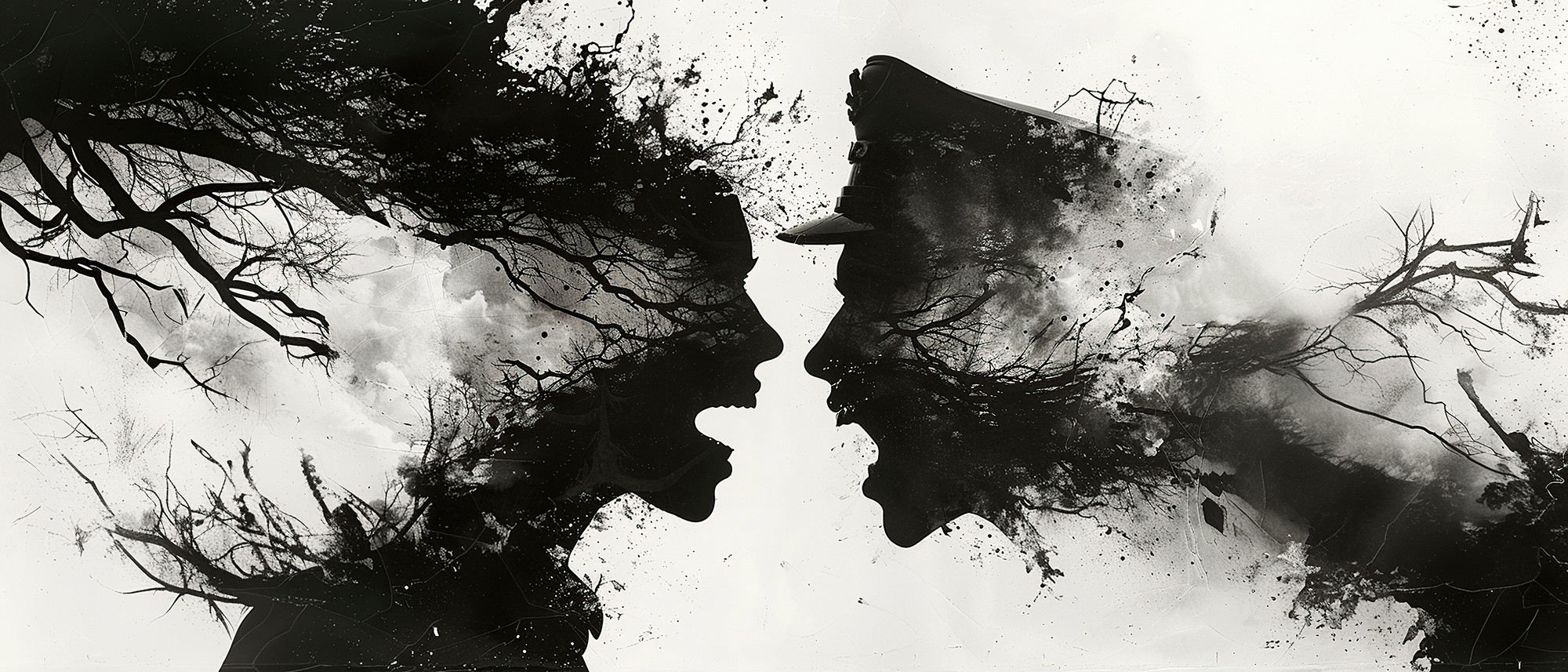
Self Doubt
Description
A persistent feeling of uncertainty about your abilities, decisions, or worth. It often leads to hesitation, second-guessing, and a lack of confidence, making it difficult to trust in your own judgment. This can all lead to the shaking your very core which holds it all together, your faith!
يَا مُقَلِّبَ الْقُلُوْبِ ثَبِّتْ قَلْبِيْ عَلَىٰ دِيْنِكَ
Yā Muqalliba-l-qulūbi thabbit qalbī ʿalā dīnik.
Translation:O Changer of the hearts, make my heart firm upon Your religion.
Anas (raḍiy Allāhu ‘anhu) said: “The Messenger of Allah ﷺ would often say [the above]. So I asked: ‘O Messenger of Allah, we believe in you and what you have come with, but do you fear for us?’ He replied: ‘Yes. Indeed the hearts are in between the two Fingers of Allah’s Fingers. He changes them as He wills.”’ (Tirmidhī 3522)
آمَنْتُ بِاللهِ وَرُسُلِهِ
Āmantu bi-llāhi wa rusulih.
Translation:I believe in Allah and His Messengers.
The Messenger of Allah ﷺ said: “Shaytān comes to one of you and says: ‘Who created you?’ He replies: ‘Allah.’ Then Shaytān says: ‘Who created Allah?’ If that happens to any one of you, let him say [the above]. Indeed it will go away from him.” (Ahmad 25671)
The Messenger of Allah ﷺ said: “Whoever experiences any of these insinuations should say [the above] thrice, and it will leave him. (Ibn al-Sunnī 629)
هُوَ الْأَوَّلُ وَالْآخِرُ وَالظَّاهِرُ وَالْبَاطِنُ ، وَهُوَ بِكُلِّ شَيْءٍ عَلِيْمٌ
Huwa-l-Awwalu wa-l-Ākhiru wa-ẓ-Ẓāhiru wa-l-bāṭin, wa Huwa bi-kulli shay’in ‘Alīm.
Translation:He is the First and the Last, the Most High and the Most Near. And He is All-Knowing about everything.
Abu Zumayy reported: “I asked Ibn Abbas (radiy Allāhū ‘anhumā): ‘What is this that I am experiencing?’ He answered: ‘What is it?’ I said: ‘By Allah, I cannot talk about it.’ He asked me: ‘Is it something to do with doubt?’ [When answered it was], he smiled and said: ‘No-one was safe from it until Allah revealed:
“If you are in doubt concerning what We revealed unto you [O Prophet], ask those who read the Scripture from before your time. The truth has indeed come to you from your Lord, so be not one of those in doubt.” (10:94)
Ibn Abbas (radiy Allāhū ‘anhumā) told me: ‘If you find any [doubt] within yourself, say: [the above].” (Abū Dāwūd 5110)
آمَنْتُ بِاللهِ وَرُسُلِهِ
Āmantu bi-llāhi wa rusulih.
Translation:I believe in Allah and His Messengers.
The Messenger of Allah ﷺ said: “Shaytān comes to one of you and says: ‘Who created you?’ He replies: ‘Allah.’ Then Shaytān says: ‘Who created Allah?’ If that happens to any one of you, let him say [the above]. Indeed it will go away from him.” (Ahmad 25671)
The Messenger of Allah ﷺ said: “Whoever experiences any of these insinuations should say [the above] thrice, and it will leave him. (Ibn al-Sunnī 629)
بِسْمِ اللّٰهِ الرَّحْمٰنِ الرَّحِيْمِ. اَلْحَمْدُ لِلّٰهِ رَبِّ الْعَالَمِيْنَ ، الرَّحْمٰنِ الرَّحِيْمِ ، مٰلِكِ يَوْمِ الدِّيْنِ ، إِيَّاكَ نَعْبُدُ وَإِيَّاكَ نَسْتَعِيْنُ ، اِهْدِنَا الصِّرَاطَ الْمُسْتَقِيْمَ ، صِرَاطَ الَّذِيْنَ أَنْعَمْتَ عَلَيْهِمْ غَيْرِ الْمَغْضُوْبِ عَلَيْهِمْ وَلَا الضَّآلِّيْنَ.
Bismi-llāhi-r-Raḥmāni-r-Raḥīm Alḥamdu-lillāhi Rabbi-l-ʿālamīn, ar-Raḥmāni-r-Raḥīm, Māliki yawmi-d-dīn, iyyāka naʿbudu wa iyyāka nastaʿīn, ihdina-ṣ-Ṣirāṭa-l-Mustaqīm, ṣirāṭa-ladhīna anʿamta ʿalayhim ghayri-l-maghḍūbi ʿālayhim wala-ḍ-ḍāllīn.
Translation:In the name of Allah, the All-Merciful, the Very Merciful. All praises and thanks are for Allah, the Lord of all the worlds, The All-Merciful, The Very Merciful, Master of the Day of Judgement. You Alone we worship, You Alone we ask for help. Guide us on the Straight Path, the path of those whom You have favoured, not of those who incur (Your) anger nor of those who have gone astray. (1:1-7)
Al-Quran
Al-Fatihah
The hadīth mentions: “The man went with them (the people of the tribe) and started spitting (on the bite) and reciting Sūrah al-Fātihah until the patient was healed and started walking as if he had not been sick.” (Bukhārī)
It was narrated from Abū Saʿīd al-Khudrī (raḍiy Allāhu ʿanhu) that the Messenger of Allah ﷺ described Sūrah al-Fātihah as a ruqyah, and he approved of the Sahābī (raḍiy Allāhu ʿanhu) who recited it as a ruqyah for the one who had been stung by a scorpion. (Bukhārī)
Ibn al-Qayyim (raḥimahullāh) said: ‘If one’s faith, soul, and spirit are strong, and if he internalises the meaning and essence of Sūrah al-Fātihah, recites it and then blows on the affected person followed by his spittle, this will counter the effects incurred by evil beings. And Allah knows best.’ (Zād al-Maʿād)
ٱلْحَمْدُ لِلَّهِ ٱلَّذِىٓ أَنزَلَ عَلَىٰ عَبْدِهِ ٱلْكِتَـٰبَ وَلَمْ يَجْعَل لَّهُۥ عِوَجَاۜ ، قَيِّمًۭا لِّيُنذِرَ بَأْسًۭا شَدِيدًۭا مِّن لَّدُنْهُ وَيُبَشِّرَ ٱلْمُؤْمِنِينَ ٱلَّذِينَ يَعْمَلُونَ ٱلصَّـٰلِحَـٰتِ أَنَّ لَهُمْ أَجْرًا حَسَنًۭا ، مَّـٰكِثِينَ فِيهِ أَبَدًۭا ، وَيُنذِرَ ٱلَّذِينَ قَالُوا۟ ٱتَّخَذَ ٱللَّهُ وَلَدًۭا ، مَّا لَهُم بِهِۦ مِنْ عِلْمٍۢ وَلَا لِـَٔابَآئِهِمْ ۚ كَبُرَتْ كَلِمَةًۭ تَخْرُجُ مِنْ أَفْوَٰهِهِمْ ۚ إِن يَقُولُونَ إِلَّا كَذِبًۭا ، فَلَعَلَّكَ بَـٰخِعٌۭ نَّفْسَكَ عَلَىٰٓ ءَاثَـٰرِهِمْ إِن لَّمْ يُؤْمِنُوا۟ بِهَـٰذَا ٱلْحَدِيثِ أَسَفًا ، إِنَّا جَعَلْنَا مَا عَلَى ٱلْأَرْضِ زِينَةًۭ لَّهَا لِنَبْلُوَهُمْ أَيُّهُمْ أَحْسَنُ عَمَلًۭا ، وَإِنَّا لَجَـٰعِلُونَ مَا عَلَيْهَا صَعِيدًۭا جُرُزًا ، أَمْ حَسِبْتَ أَنَّ أَصْحَـٰبَ ٱلْكَهْفِ وَٱلرَّقِيمِ كَانُوا۟ مِنْ ءَايَـٰتِنَا عَجَبًا ، إِذْ أَوَى ٱلْفِتْيَةُ إِلَى ٱلْكَهْفِ فَقَالُوا۟ رَبَّنَآ ءَاتِنَا مِن لَّدُنكَ رَحْمَةًۭ وَهَيِّئْ لَنَا مِنْ أَمْرِنَا رَشَدًۭا.
Alhamdu lillaahil lazeee anzala 'alaa 'abdihil kitaaba wa lam yaj'al lahoo 'iwajaa
Qaiyimal liyunzira ba'asan shadeedam mil ladunhu wa yubashshiral mu'mineenal lazeena ya'maloonas saalihaati anna lahum ajran hasanaa
Maakiseena feehi abadaa
Wa yunziral lazeena qaalut takhazal laahu waladaa
Maa lahum bihee min 'ilminw wa laa li aabaaa'ihim; kaburat kalimatan takhruju min afwaahihim; iny yaqooloona illaa kazibaa
Fala'allaka baakhi'un nafsaka 'alaaa aasaarihim illam yu'minoo bihaazal hadeesi asafaa
Innaa ja'alnaa ma 'alal ardi zeenatal lahaa linabluwahum ayyuhum ahsanu 'amalaa
Wa innaa la jaa'iloona maa 'alaihaa sa'eedan juruzaa
Am hasibta anna Ashaabal Kahfi war Raqeemi kaanoo min Aayaatinaa 'ajabaa
Iz awal fityatu ilal Kahfi faqaaloo Rabbanaaa aatinaa mil ladunka rahmatanw wa haiyi' lanaa min amrinaa rashadaa
All praise is for Allah Who has revealed the Book to His servant, allowing no crookedness in it, [making it] perfectly upright, to warn [the disbelievers] of a severe torment from Him; to give good news to the believers—who do good—that they will have a fine reward, in which they will remain forever; and to warn those who claim, “Allah has offspring.” They have no knowledge of this, nor did their forefathers. What a terrible claim that comes out of their mouths! They say nothing but lies. Now, perhaps you [O Prophet] will grieve yourself to death over their denial, if they [continue to] disbelieve in this message. We have indeed made whatever is on earth as an adornment for it, in order to test which of them is best in deeds. And We will certainly reduce whatever is on it to barren ground. Have you [O Prophet] thought that the people of the cave and the plaque1 were [the only] wonders of Our signs? [Remember] when those youths took refuge in the cave, and said, “Our Lord! Grant us mercy from Yourself and guide us rightly through our ordeal.”
Abū Dardā’ (raḍiy Allāhu ʿanhu) reported the Prophet ﷺ saying: “Whoever preserves the first ten verses of the Sūrah al-Kahf, he will be protected from the Dajjāl.” (Muslim 809)
اَللّٰهُمَّ إِنِّيْ أَعُوْذُ بِكَ مِنْ عَذَابِ جَهَنَّمَ ، وَمِنْ عَذَابِ الْقَبْرِ ، وَمِنْ فِتْنَةِ الْمَحْيَا وَالْمَمَاتِ ، وَمِنْ شَرِّ فِتْنَةِ الْمَسِيْحِ الدَّجَّالِ
Allāhumma innī aʿūdhu bika min ʿadhābi jahannam, wa min ʿadhābi-l-qabr, wa min fitnati-l-maḥyā wa-l-mamāt, wa min sharri fitnati-l-masīḥi-d-dajjāl.
Translation:O Allah, I seek Your protection from the punishment of the Hell-fire, and from the punishment of the grave, and from the trials of life and death, and from the evil of the tribulation of Dajjāl, the false Messiah.
The Messenger of Allah ﷺ said: “After the tashahhud (in Salāh), one should seek Allah’s protection from four things by saying [the above].” (Muslim 588)
He ﷺ also said: “If anyone learns the first ten verses of Sūrah al-Kahf by heart, he will be protected from Dajjāl.” (Muslim 809)
اَللّٰهُمَّ إِنِّيْ أَعُوْذُ بِكَ أَنْ أُشْرِكَ بِكَ وَأَنَا أَعْلَمُ ، وَأَسْتَغْفِرُكَ لِمَا لَا أَعْلَمُ
Allāhumma innī aʿūdhu bika an ushrika bika wa-ana aʿlam, wa astaghfiruka limā lā aʿlam.
Translation:O Allah, I seek Your protection from knowingly committing shirk and seek Your forgiveness for unknowingly (committing it).
The Messenger of Allah ﷺ said: “O people, beware of this shirk, for it is more subtle than the footsteps of an ant.” The one whom Allah willed should speak asked him: “How can we beware of it when it is more subtle than the footsteps of an ant, O Messenger of Allah?” He replied: “Say [the above].” (Ahmad 3731)
Ma’qil bin Yasār (raḍiy Allāhu ‘anhu) narrated: “I walked with Abū Bakr Siddīq (raḍiy Allāhu ‘anhu) to the Messenger of Allah ﷺ. He ﷺ said: “O Abū Bakr! This shirk is more subtle than the footsteps of an ant.” Abū Bakr asked, “Is shirk not only when a person ascribes a partner with Allah?” The Messenger of Allah ﷺ replied: By the One in whose hands my life is, shirk is more subtle than the footsteps of an ant. Shall I not guide you towards something which if you say, it will remove it’s minor and major? He ﷺ said: “Say [the above].” (Al-Adab al-Mufrad 716)




